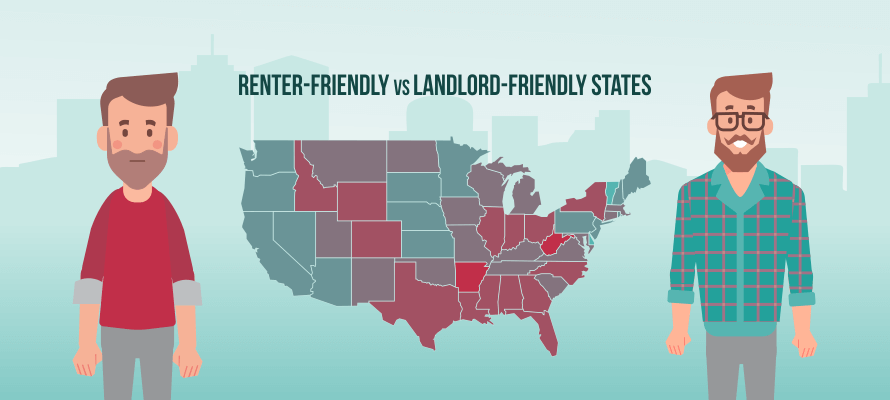The air conditioning system in your rental apartment broke 3 days ago, it’s 100F degrees outside and more humid than the Amazonian rainforest. Your landlord has promised to repair it soon, but three days later he’s not even returning your phone calls. As much as you love the sauna, living in one day and night is not your idea of “home spa”. What can you do?
The answer depends on where you live. Your legal options can be very different from state to state. To find out exactly how different, we compared and contrasted landlord-tenant laws in 50 U.S. states and the District of Columbia. We focused on 10 common aspects of the landlord-tenant relationship, which include security deposits, rent increases, the warranty of habitability and eviction notices. We then created a ranking system based on the best and worst scenarios for renters and landlords (more on how we ranked the states in the Methodology section).
Which states have the best and worst laws for renters? Here they are on a map:
Vermont ranked first among the renter-friendly states, followed closely by Delaware and Hawaii who were tied for second place. Rhode Island, Arizona, D.C., Maine and Alaska Statutes also seem to take good care of their renters according to our analysis. On the other end of the spectrum, the laws in Arkansas and West Virginia were the least friendly to their renters, with Louisiana, Georgia, Wyoming, North Carolina, Idaho, Ohio, Mississippi and Colorado following in their footsteps. Arkansas and West Virginia registered the same score on our scale, but since Arkansas is the only state where tenants can face criminal charges for failure to vacate, it earned the last place on our renter-friendly scale.
How rental laws were shaped by regional culture
The U.S. is in some ways a nation of nations, with each state having the right to create their own constitution and government. In time, this facilitated the creation of very different laws and regulations with local culture and sensibilities playing a huge role in shaping the state’s legislation.
Southern states, which used to rely mostly on agriculture during the first days of our nation, valued land ownership above all else and subsequently shaped their laws to protect landlords and their properties. Northern states, on the other hand, focused more on manufacturing and trade, encouraging constant immigration from Europe. Since most of the population worked in factories and lived in crowded cities, it only makes sense that eventually they developed more and more laws that regulated renting.
Legislation in Mountain states also seems to mostly favor landlords, but probably because renting was less common and there wasn’t much opposition from renters. Reversely, in areas where renters outnumber owners, the laws lean towards protecting renters.
How different can rental laws really be?

Let’s say Vinny lives in Vermont, Arnie lives in Arkansas and they’re both considering a new rental apartment. They each sign a one-year lease and look forward to a good relationship with their landlord. Just a few weeks into the lease, the apartment’s HVAC system breaks down. They send notices to their landlords regarding the issue, but neither landlord fixes the issue. Vinny may then proceed to withhold paying rent to coerce his landlord to fix the problem. Arnie, on the other hand, is forced to pay his rent even though the apartment has serious habitability issues. The only way Arnie can fight back is by suing his landlord and hoping for the best.
The HVAC system is finally repaired after the lawsuit. Further along the way, Vinny and Arnie encounter some financial problems which in turn cause them to be 5 days late on rent. Vinny receives a 14-day notice from his landlord to remedy or quit, allowing him enough time to come up with the money. Arnie’s landlord is still holding a grudge against him because of the lawsuit, so he decides to terminate the lease under the “failure to vacate method”. Arnie now has just 10 days to vacate the premises or he will face criminal charges. He manages to scrape the money needed for the past due rent, pays his landlord, and vacates the apartment in a hurry.
A few days later he discovers he accidentally left his heirloom watch at the apartment. Under Arkansas law, the watch is now the property of the landlord and there’s nothing he can do about it. If this would have happened to Vinny, he’d still have 60 days to recover his belongings and his landlord would be obligated to store it safely for that time period. Finally, Arnie asks his landlord to return his security deposit so he can afford to rent a new apartment. Unfortunately for him, the landlord can hold the money for another 60 days after the tenancy has ended. Vinny would have the money back in his pocket in just 14 days. Poor Arnie.
The best states for common renting issues
The relationship between landlords and tenants may sometimes prove tricky to manage and problems may emerge because of either side not holding up their end of the agreement. That’s why it is important for states to have concise and unbiased legislation in place so as to avoid any misunderstandings.
The security deposit is an issue that every renter faces at the beginning of a new lease. There are 10 states that limit the security deposit amount to the equivalent of one month’s rent (for unfurnished apartments on a one-year lease). Among them are Hawaii, District of Columbia, Rhode Island, Massachusets, and Kansas.
Not having to wait forever to get your security deposit back (after any applicable deductions) at the end of your lease can also be a blessing, especially when you need that money to put down a deposit on your next apartment. Renters in Montana are the luckiest in that regard, as they’ll get theirs back in no more than 10 days. In Hawaii, South Dakota, Nebraska, Arizona, and Vermont landlords are required to return security deposits within 14 days.
When bad luck strikes and you run out of money right before your rent is due, it’s nice to have a few extra days to come up with the cash before you get kicked to the curb. If you live in the District of Columbia, you get the longest termination notice for nonpayment of rent: 30 days. In the following 5 states, renters receive a 14-day notice: Vermont, Wisconsin, Minnesota, Massachusetts, and Tennessee.
Rent increases can feel like a shockwave on your wallet, so an advance notice can be useful to brace for impact. Renters in Georgia, Vermont, and Delaware receive a generous 60-day notice of rent increase for month-to-month contracts, while those in Maine, Hawaii, and Nevada, 30 days.
The worst states for common renting issues
Vermont might have the best laws for renters, but it’s also one of the 24 states that don’t set a limit for security deposits, so nobody is perfect. Other examples are Georgia, Washington, Texas, Illinois, and New York.
Being able to withhold rent for failure to provide essential services (heat, hot water, electricity) is another law which many would consider common sense, yet there are 11 states which don’t specifically allow this. In other words, if you live in Alabama, Georgia, Texas, North Carolina, Louisiana or 6 other states, and your A/C happens to break on a hot and sticky day, good luck to you!
Furthermore, 14 states empower landlords to use harsh measures like serving an Unconditional Quit Notice against renters who violate their lease. Arizona, Hawaii, Virginia, Rhode Island, and South Carolina are some of them. To be fair, the situations in which this practice is allowed usually relate to serious breaches of the rental agreement such as illegal drug possession, prostitution or other criminal activities. But there are also states where this type of notice can be used for simply being late on rent (Georgia, South Carolina, and West Virginia).
Also, in 8 states, including Maryland, Georgia, New Jersey, South Dakota, and Missouri, landlords have the option to immediately terminate a lease and file for eviction when the tenant is just a few days late on rent.
Here are a few other interesting laws we’ve run across during our study:
- In Wisconsin, if the landlord auctions or sells abandoned tenant property, the proceeds must be given to the Wisconsin Department of Administration, which uses the money to help feed the homeless
- In Illinois the law on abandoned tenant property only covers crops
- Lockouts and utility shut-offs are never allowed in any state
Highlights of some of your home state’s landlord-tenant laws:
This article was originally posted on rentcafe.com
Moving Soon? TruckFrat provides moving assistance for people in Atlanta and surrounding areas looking to move on a budget.
Our moving prices includes your movers, truck and basic moving equipment. We do not charge a 2 hour minimum charge like most moving companies. Same day moves are available for no extra cost! Book us today.

